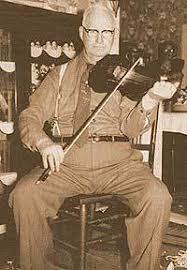William Hamilton Stepp
William Hamilton Stepp | |
|---|---|
 Image taken by Alan Lomax in 1937 | |
| Background information | |
| Also known as | W.H. Stepp, Bill Stepp |
| Born | April 11, 1875 Beattyville, Kentucky, U.S. |
| Died | November 13, 1957 (aged 82) Knox County, Indiana, U.S. |
| Genres | Fiddle music |
| Occupation(s) | Musician |
This article needs additional citations for verification. (January 2022) |
William Hamilton Stepp (April 11, 1875 – November 13, 1957) was an American old-time fiddle player. In 1937, Stepp recorded for Alan Lomax and the Library of Congress, with his best-known tune being "Bonaparte's Retreat".
Early life
Stepp was born the youngest of three illegitimate children in Beattyville, Kentucky, in April 1875. His father William Taylor Seale was a prominent leader of the county who did not recognize the offspring's existence, while Stepp's mother, Lucinda Stepp, was a half-Native American living in poverty. In 1880, William Stepp's mother and sister were arrested for prostitution.[1][2] After the arrests, Stepp was adopted by Asa Smyth, as Stepp's family could no longer take care of him. Around the same time, he began practicing the fiddle.[3]
Career
In the 1890s, Stepp relocated to
More than hundred people -- a sizable gathering for that time -- from throughout the region came to dance to his fiddle. As Bill played from his back porch Congleton's house, the guests 'ran figures' along the wide, flat yard that lay behind the house. For some numbers he joined them himself, standing up to clog while he continued to draw his bow.[5]
In October 1937,
Personal life
Bill's first wife was Cornelia Moe, who he married in 1896.[3]
Though Stepp continued to perform, he abandoned his family to move to Knox County, Indiana where he died in 1957.[1]
Legacy
- His song "Bonaparte's Retreat" was admitted into the National Recording Registry in 2016, along with 24 other recordings.[6]
- Stepp's version of the song was used as a major component of Beef. It's What's For Dinner".
References
- ^ a b "William Hamilton Stepp". oldtimemusic.com. Retrieved August 13, 2015.
- ^ "Stepp Down Hoedown". violinist.com. Retrieved August 13, 2015.
- ^ JSTOR 3052581.
- ^ "American Fiddler Tunes (CD booklet)". Rounder Records. 2000.
{{cite web}}: Missing or empty|url=(help) - ^ ISBN 9780252094002.
- Washington D.C.Retrieved 2020-06-19.
